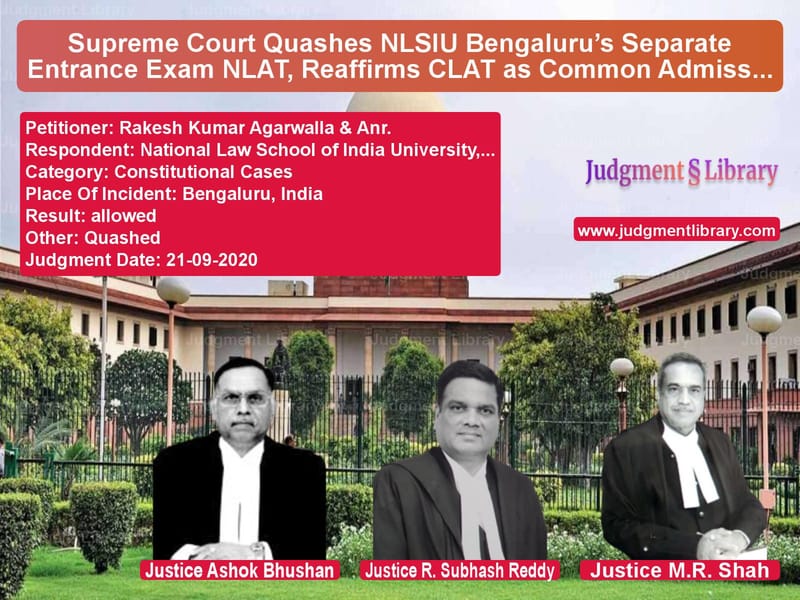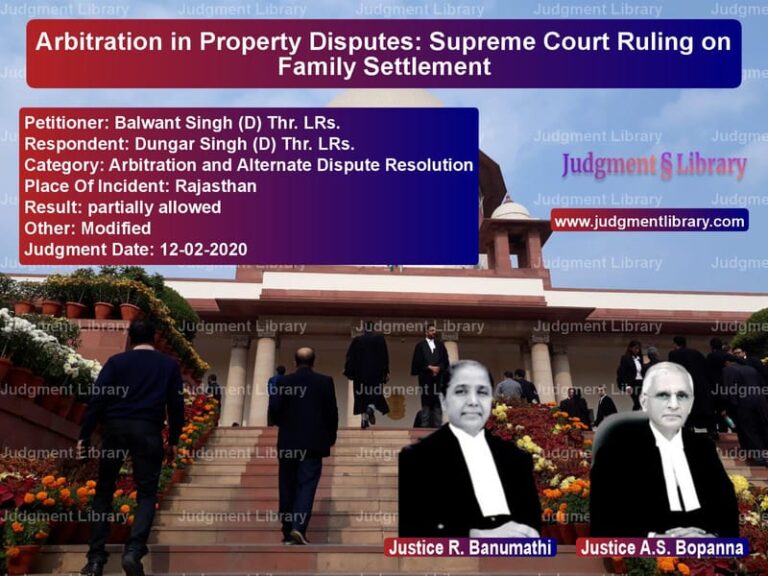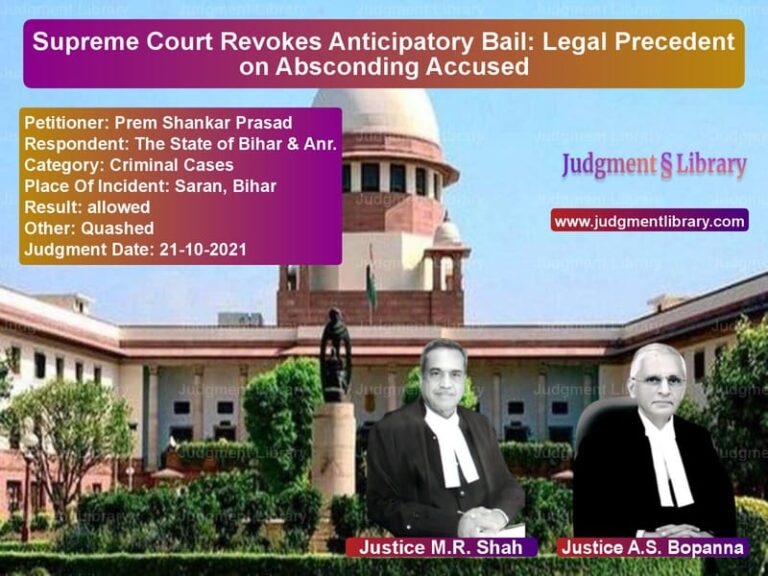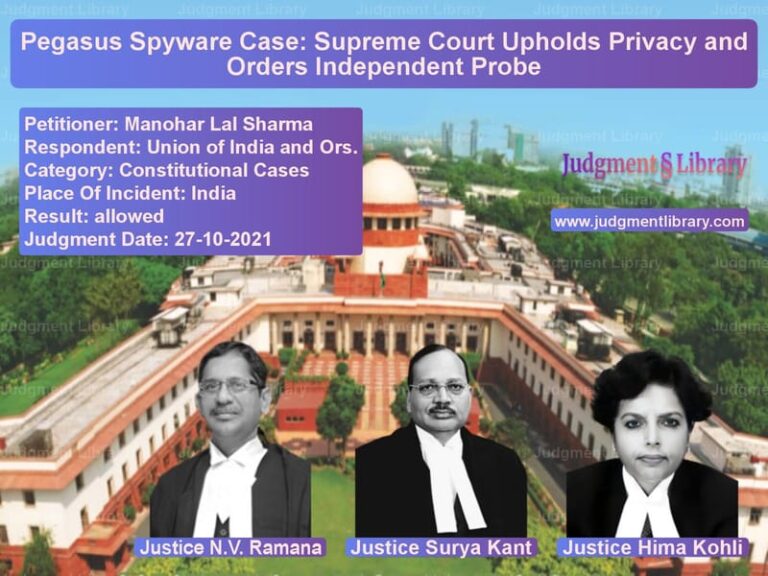Supreme Court Quashes NLSIU Bengaluru’s Separate Entrance Exam NLAT, Reaffirms CLAT as Common Admission Test
The Supreme Court of India, in its landmark ruling in Rakesh Kumar Agarwalla & Anr. vs. National Law School of India University (NLSIU), Bengaluru & Ors., struck down the decision of NLSIU to conduct a separate entrance exam, the National Law Aptitude Test (NLAT), for admissions to its law programs for the academic year 2020-21. The Court ruled that NLSIU, as a member of the CLAT Consortium, could not unilaterally withdraw from the Common Law Admission Test (CLAT) without following due legal procedures.
The verdict ensures a uniform admission process for all National Law Universities (NLUs) and prevents institutions from creating individual barriers to legal education. This judgment is crucial in reinforcing the principles of transparency, fairness, and accessibility in national-level competitive examinations.
Background of the Case
NLSIU, India’s premier law school, was established under the National Law School of India Act, 1986, to set high standards for legal education. Over the years, other NLUs were set up across India, and a unified admission process—the Common Law Admission Test (CLAT)—was adopted to ensure fairness and transparency.
However, in 2020, citing delays in the conduct of CLAT due to the COVID-19 pandemic and its trimester system, NLSIU decided to conduct its own entrance test, the National Law Aptitude Test (NLAT). The university claimed that further delay in admissions would lead to a ‘zero year,’ affecting its academic schedule.
The decision sparked controversy among law aspirants, many of whom were unaware of the abrupt change and found themselves at a disadvantage. This led to multiple petitions challenging the legality of the NLAT.
Legal Issues Raised
The petitioners approached the Supreme Court under Article 32 of the Indian Constitution, raising the following key legal questions:
- Whether NLSIU Bengaluru, a founding member of the CLAT Consortium, could unilaterally conduct a separate entrance examination without prior approval from the Consortium?
- Whether the NLAT violated the principles of fairness and transparency, as guaranteed under Articles 14 and 21 of the Constitution?
- Whether the home-based proctored format of NLAT was prone to technical malpractices, making the examination unreliable?
- Whether NLSIU’s decision placed an undue burden on students, especially those from marginalized backgrounds who were unaware of the sudden change?
Arguments by the Petitioners
The petitioners, represented by Senior Counsel, put forth the following arguments:
- The decision of NLSIU to hold its separate entrance exam was arbitrary, illegal, and ultra vires as the university was bound by the CLAT Consortium agreement.
- CLAT was designed to provide a uniform, transparent, and merit-based admission system across all NLUs, and any unilateral withdrawal without legal sanction violated the principles of natural justice.
- The NLAT was announced abruptly, giving students only a few days to prepare and register, leading to confusion and unfair disadvantages.
- The online, home-based proctored test format was unreliable, as students faced technical glitches, network failures, and allegations of unfair practices, rendering the exam unfit for an objective admission process.
- The sudden introduction of NLAT disproportionately affected students from rural and economically weaker sections, violating their right to equal opportunity under Article 14.
Arguments by NLSIU Bengaluru
NLSIU, represented by Senior Counsel, defended its decision, arguing:
- The university follows a trimester system, unlike other NLUs, and any further delay in admissions due to CLAT postponement would have resulted in a loss of an academic year.
- The Executive Council of NLSIU had empowered the Vice-Chancellor to take necessary steps to ensure timely admissions.
- NLAT was conducted with AI-based remote proctoring and strict security protocols, ensuring fairness and preventing malpractice.
- There was no contractual obligation that prevented NLSIU from conducting its own entrance test, as CLAT was merely a coordinating body, not a statutory regulator.
Supreme Court’s Ruling
On the Validity of NLAT
The Supreme Court ruled that:
- NLSIU’s unilateral decision to conduct NLAT was unjustified and contrary to the principles of fair admissions.
- By being a member of the CLAT Consortium, NLSIU was bound by its regulations and could not introduce a separate entrance test arbitrarily.
- Transparency in entrance examinations is a fundamental right of students, and any deviation from established procedures must be supported by strong legal backing.
On the Home-Proctored Format
The Court took note of multiple complaints regarding the NLAT’s home-based format, stating:
- Several students faced technical issues, login failures, and disconnections during the exam.
- The proctoring mechanism was prone to manipulation, raising doubts over the credibility of the test.
- The abrupt introduction of NLAT placed an undue burden on students who had already prepared for CLAT.
On Fairness and Accessibility
The Court emphasized that:
- The principle of equality under Article 14 mandates that no student should face undue hardship in accessing education.
- NLAT’s announcement on short notice deprived many students, especially those from economically weaker sections, of a fair chance to apply.
- CLAT, as a uniform national-level test, ensures equal opportunity and must remain the primary entrance exam for NLUs.
Final Judgment
The Supreme Court quashed the NLAT notification and ruled that:
- NLSIU must admit students based on CLAT 2020.
- NLSIU cannot unilaterally exit the CLAT Consortium without following due process.
- Students who took NLAT shall not suffer any academic loss and will be included in the CLAT merit list.
Legal Principles Established
This ruling reinforces several key legal principles:
- Standardization in Competitive Exams: Universities cannot arbitrarily introduce separate entrance tests when part of a collective admission process.
- Right to Fair Admissions: Every student must have an equal opportunity to compete in national-level exams.
- Institutional Accountability: Member institutions of a governing body cannot act independently without proper authorization.
Conclusion
The Supreme Court’s decision in Rakesh Kumar Agarwalla & Anr. vs. NLSIU Bengaluru upholds the integrity of national-level entrance examinations. By quashing NLAT, the Court has ensured that no student is unfairly disadvantaged by arbitrary decisions of individual institutions.
This ruling sets a precedent for all educational institutions, reinforcing that fairness, transparency, and accessibility in admissions are paramount.
Petitioner Name: Rakesh Kumar Agarwalla & Anr..Respondent Name: National Law School of India University, Bengaluru & Ors..Judgment By: Justice Ashok Bhushan, Justice R. Subhash Reddy, Justice M.R. Shah.Place Of Incident: Bengaluru, India.Judgment Date: 21-09-2020.
Don’t miss out on the full details! Download the complete judgment in PDF format below and gain valuable insights instantly!
Download Judgment: Rakesh Kumar Agarwal vs National Law School Supreme Court of India Judgment Dated 21-09-2020.pdf
Direct Downlaod Judgment: Direct downlaod this Judgment
See all petitions in Fundamental Rights
See all petitions in Constitution Interpretation
See all petitions in Public Interest Litigation
See all petitions in Judgment by Ashok Bhushan
See all petitions in Judgment by R. Subhash Reddy
See all petitions in Judgment by Mukeshkumar Rasikbhai Shah
See all petitions in allowed
See all petitions in Quashed
See all petitions in supreme court of India judgments September 2020
See all petitions in 2020 judgments
See all posts in Constitutional Cases Category
See all allowed petitions in Constitutional Cases Category
See all Dismissed petitions in Constitutional Cases Category
See all partially allowed petitions in Constitutional Cases Category







